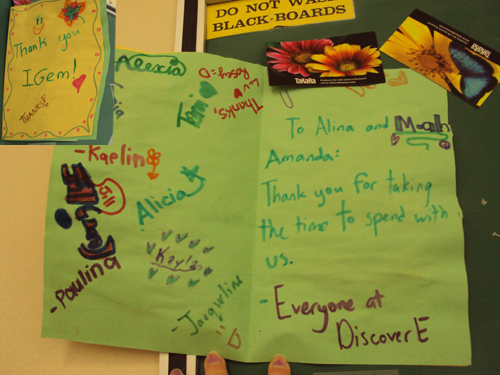Team:Alberta/human practices
From 2010.igem.org
Human Practices
The focus of GENOMIKON, from the beginning, was to empower anyone to try synthetic biology for themselves. This tool kit introduces synthetic biology and delivers hands-on molecular biology education in a novel and concrete way. GENOMIKON is bound to instill excitement and creativity in high school classrooms. Our goal was to create a comprehensive kit for the rapid and effective construction of plasmids using limited and affordable technology. In this way, GENOMIKON is readily accessible to public educational institutions. However, GENOMIKON will never be able to teach anyone if it never makes its way into classrooms. With this in mind, we decided to address this issue by incorporating human practice elements into our projects. In particular, we investigated the market in which GENOMIKON would enter and invited middle school girls from DiscoverElle and high school students into our laboratory to learn about synthetic biology and participate in an experiment using GENOMIKON.
Distribution Plan and Market Analysis
With our goal in mind, we investigated exactly how GENOMIKON could be placed in high schools across the world and incorporated into grade 12/senior curricula. To address the issue of accessibility, undergraduate students from the University of Alberta's School of Business created a hypothetical distribution plan and market analysis designed to bring GENOMIKON to the market. This model is aimed to educate students across the world on the science behind and potential of genetic engineering. GENOMIKON will only be an effective teaching tool if it reaches students.
Social Aspect
iGEM first and foremost teaches us valuable problem solving and research based skills. But iGEM is also a means of building relationships, especially orchestrating cooperation among various people from many different backgrounds. This summer, all three Albertan teams (University of Alberta, University of Calgary and the University of Lethbridge) met once in each hometown and participated in workshops. This allowed us to effectively exchange ideas and work together towards our individual project goals. aGEM, one of our regional workshops that was held in Edmonton, served as an arena in which we could present our projects to the other teams and the field's professionals. We are grateful to AITF for putting on aGEM and our other workshops.
 "
"

